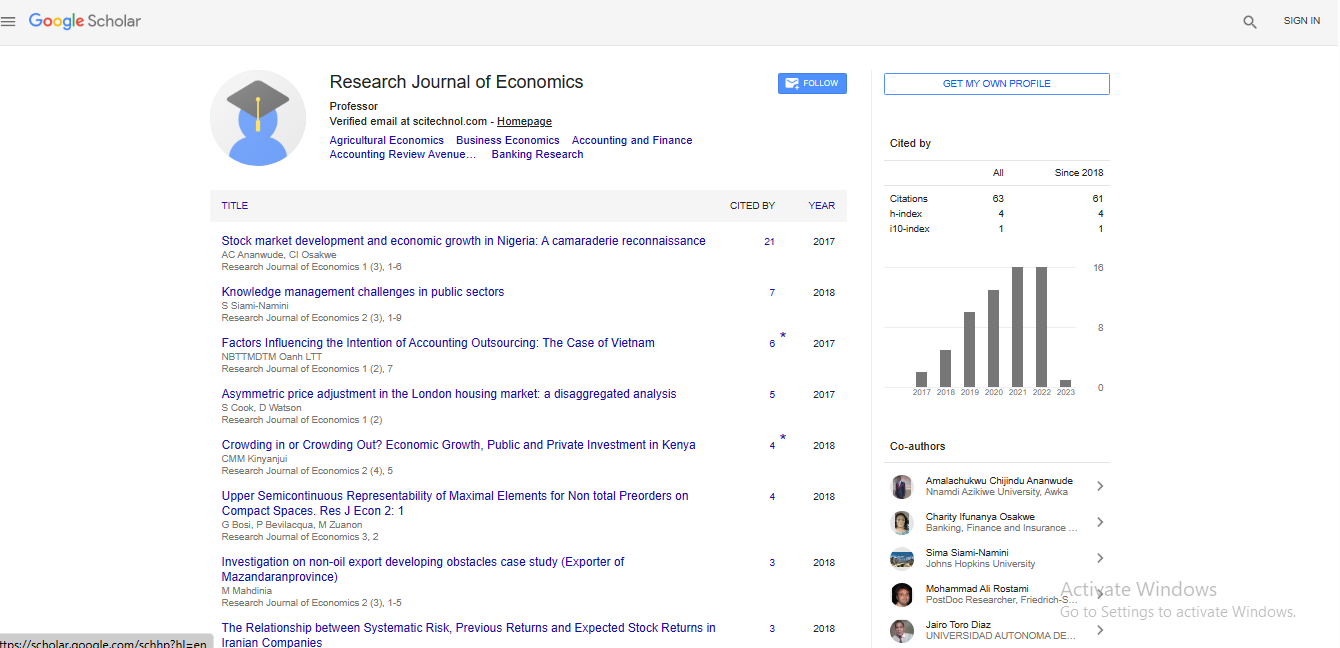Commentary, Res J Econ Vol: 7 Issue: 1
Economic Analysis for Strengthening Business Performance
Akinobu Valente*
Department of Management, University of Turin, Turin, Italy
*Corresponding Author: Akinobu Valente
Department of Management, University of Turin, Turin, Italy
E-mail: akinovalen@unito.it
Received date: 01 January, 2023, Manuscript No. RJE-23-95802;
Editor assigned date: 03 January, 2023, PreQC No. RJE-23-95802 (PQ);
Reviewed date: 17 January, 2023, QC No. RJE-23-95802;
Revised date: 24 January, 2023, Manuscript No. RJE-23-95802 (R);
Published date: 31 January, 2023, DOI: 10.4172/RJE.1000131
Citation: Valente A (2023) Economic Analysis for Strengthening Business Performances. Res J Econ 7:1.
Description
Strong corporate performance cannot be easily achieved or maintained in the dynamic and competitive economic environment in these days. Businesses face numerous challenges, ranging from changing market conditions to evolving consumer preferences, and navigating these complexities requires informed decision-making. Economic analysis, as a powerful tool, can provide valuable insights and strategies to help businesses optimize their performance and achieve sustained success.
The core of economic analysis involves the systematic study of economic factors that influence business operations. This includes analyzing supply and demand dynamics, market trends, consumer behavior, and government policies, among other factors. By examining these factors, businesses can gain a deeper understanding of the economic environment in which they operate and make informed decisions to strengthen their performance.
One of the key ways in which economic analysis can enhance business performance is through optimizing resource allocation. Resources such as capital, labor, and time are limited, and allocating them efficiently and effectively is essential to achieving optimal outcomes. Economic analysis helps businesses identify the most profitable investment opportunities, determine optimal production levels, and assess the cost-effectiveness of different strategies. By utilizing economic analysis, businesses can make informed decisions about resource allocation, resulting in improved profitability and operational efficiency.
This economic analysis can also aid in identifying new market opportunities and developing effective business strategies. Understanding market trends, consumer preferences, and competitive forces can help businesses identify gaps in the market and tailor their products or services accordingly. Economic analysis can also assist businesses in evaluating the potential risks and benefits of entering new markets, expanding operations, or diversifying their product offerings. By leveraging economic analysis in strategic planning, businesses can make informed decisions about growth and expansion, reducing uncertainty and increasing their chances of success.
In addition, economic analysis is important for navigating the complex landscape of government policies and regulations that impact businesses. Tax policies, trade policies, labor regulations, and environmental regulations are just a few examples of the many factors that can affect a business's operations and financial performance. Economic analysis can help businesses understand the implications of these policies on their costs, revenues, and profitability, and enable them to make appropriate adjustments to their business strategies to comply with regulations and mitigate risks.
Moreover, economic analysis provides businesses with the ability to assess the financial feasibility of various projects or initiatives. By conducting cost-benefit analysis, businesses can evaluate the potential return on investment for different projects or initiatives and make informed decisions about their viability. This helps businesses allocate their resources strategically and prioritize projects or initiatives that are likely to yield the highest returns, contributing to overall business performance.
Economic analysis is an important tool for strengthening business performance. It provides valuable insights and strategies that enable businesses to optimize resource allocation, identify market opportunities, develop effective business strategies, and navigate regulatory challenges. Embracing economic analysis as a core component of decision-making can unlock the path to success for businesses, enabling them to achieve sustained performance and thrive in today's competitive business landscape.
As businesses face increasing pressures to succeed and thrive, incorporating economic analysis into their decision-making process is more important than ever. By leveraging the power of economic analysis, businesses can gain a competitive edge, make informed decisions, and drive performance optimization, setting them on a path to sustained success in today's dynamic business landscape.
So, business leaders take heed of the benefits of economic analysis and make it an integral part of your decision-making toolkit. Embrace economic analysis as a guiding framework for strategic planning and resource allocation processes, and unlock the potential for strengthened business performance and a brighter future for the organization. The path to success starts with economic analysis-a powerful tool that can pave the way for your business to thrive in today's challenging business landscape.
 Spanish
Spanish  Chinese
Chinese  Russian
Russian  German
German  French
French  Japanese
Japanese  Portuguese
Portuguese  Hindi
Hindi 